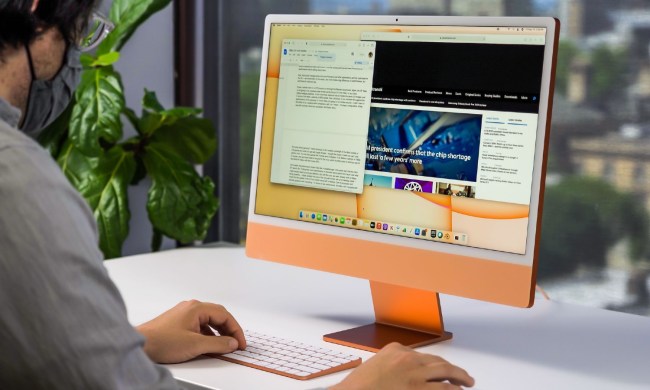Apple announced the new 27-inch Studio Display at its Peek Performance event on Tuesday. The monitor is a successor to 2019’s Pro Display XDR, and it’s the second external display Apple has released.
It’s a 5K Retina display, and the screen size shakes out to a pixel density of 218 pixels per inch. It’s available to purchase today for $1,599, and Apple says it will be available to everyone on March 18. Users can choose between a swivel mount that offers up to 30 degrees of swivel or a height-and-swivel mount similar to the Pro Display XDR’s. The height-adjustable mount costs an extra $400.

For specs, the monitor comes with 600 nits of brightness, bypassing most of the best monitors on the market, and itfeatures an antireflective coating. Apple is offering its nano-texture coating as well, though we’re not sure how much extra it will cost.
Around the back of the monitor, you’ll find three USB-C ports capable of 10Gb/s of data transfer, as well as a single Thunderbolt port. Apple says the Thunderbolt port can supply up to 96 watts of power, so you can take advantage of fast charging while using the display. You can also connect up to three Studio Displays to the MacBook Pro.
Apple focused a lot on the monitor’s speakers. The monitor has six speakers spread across four force-canceling woofers for the bass and two tweeters for the mids and highs. All of the speakers are routed separately, meaning the display can offer virtual spatial audio with support for Dolby Atmos.

The Studio Display also includes an array of three microphones for video calls. These microphones have a low noise floor to pick up minute detail, and the array should help cancel out unwanted noise.
The robust audio system is enabled by an Apple A13 Bionic chip built into the monitor. This is the same processor inside the iPhone 11 Pro and iPhone 11 Pro Max. In addition to the audio, the processor enables a camera system on the display. It comes with a built-in 12MP ultrawide camera, which is the same camera in the new iPad Air 5.
It also supports Apple Center Stage, which previously was reserved for iPads. Center Stage is a feature for some of Apple’s webcams that allows the camera to automatically track and frame you in the center of the shot. With it on, you can take advantage of the ultrawide lens without having too much empty space on the edges of the frame.

Bloomberg reporter Mark Gurman, who has made a name for himself with accurate Apple predictions through his Power On newsletter, said prior to the event that the display was completed “months ago.” Despite that, details have been scarce about the monitor. We only learned about the monitor a few days prior to the event, and without complete details.
Speculation ahead of the show pointed to a 27-inch monitor with a 7K resolution. Some leakers suggested Apple would go with a Mini LED display, while others claimed it would be a budget alternative to the Pro Display XDR. What’s not clear is if the Studio Display will replace the Pro Display XDR in Apple’s lineup, as the latter comes in a 32-inch size.



